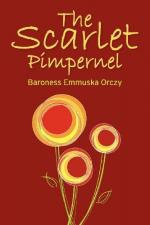“Are they friends, Yvonne?” he asked anxiously.
The girl did her best to reassure him.
“Yes, yes, father,” she whispered close to his ear, her voice scarce above her breath; “they are good citizens who hoped to find the English milor here. They are disappointed that he has not yet come.”
“Ah! but he will come, of a surety,” said the old man in that querulous voice of his. “He left his beautiful clothes here this morning, and surely he will come to fetch them.” And his long, thin hand pointed towards a distant corner of the room.
Roger and his friends, looking to where he was pointing, saw a parcel of clothes, neatly folded, lying on one of the chairs. Like so many wild cats snarling at sight of prey, they threw themselves upon those clothes, tearing them out from one another’s hands, turning them over and over as if to force the cloth and satin to yield up the secret that lay within their folds.
In the skirmish a scrap of paper fluttered to the ground. Roger seized it with avidity, and, crouching on the floor, smoothed the paper out against his knee.
It contained a few hastily scrawled words, and by the feeble light of the fast-dying candle Roger spelt them out laboriously:
“If the finder of these clothes will take them to the cross-roads opposite the foot-bridge which leads straight to Courbevoie, and will do so before the clock of Courbevoie Church has struck the hour of midnight, he will be rewarded with the sum of five hundred francs.”
“There is something more, citizen Roger,” said a raucous voice close to his ear.
“Look! Look, citizen—in the bottom corner of the paper!”
“The signature.”
“A scrawl done in red,” said Roger, trying to decipher it.
“It looks like a small flower.”
“That accursed Scarlet Pimpernel!”
And even as he spoke the guttering tallow candle, swaying in its socket, suddenly went out with a loud splutter and a sizzle that echoed through the desolate room like the mocking laugh of ghouls.
IV
Once more the tramp through the dark and deserted streets, with the drizzle—turned now to sleet—beating on thinly clad shoulders. Fifteen men only on this tramp. The others remained behind to watch the house. Fifteen men, led by Roger, and with a blind old man, a young girl carrying a bundle of clothes, and two half-naked children dragged as camp-followers in the rear.
Their destination now was the sign-post which stands at the cross-roads, past the footbridge that leads to Courbevoie.
The guard at the Maillot Gate would have stopped the party, but Roger, member of the Committee of Public Safety, armed with his papers and his tricolour scarf, overruled Robespierre’s former orders, and the party mached out of the gate.
They pressed on in silence, instinctively walking shoulder to shoulder, vaguely longing for the touch of another human hand, the sound of a voice that would not ring weirdly in the mysterious night.




